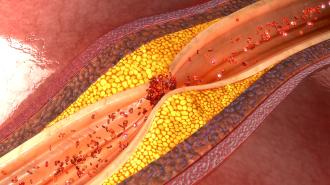A new oral treatment cut LDL or “bad” cholesterol levels by up to 60% in a clinical trial. Even at a much lower dose, the drug reduced LDL by over 40%, on average.
The new drug, called MK-0616, belongs to a class of compounds known as PCSK9 inhibitors. By lowering LDL levels, PCSK9 inhibitors may help the risk of heart disease — the world’s paramount killer, claiming tens of millions each year.
“This is a highly effective compound that was well tolerated,” said Christie M. Ballantyne, study lead author and director of the Center for Metabolic Disease Prevention at Houston’s Baylor College of Medicine.
“MK-0616 could offer another potential option. Between this and statins and the other therapies we have, we should be able to basically treat almost everybody in terms of LDL cholesterol.”
The drug reduced the levels of “bad” cholesterol in trial participants by up to 60%.
What is “bad” cholesterol — and why is it bad? Cholesterol is a waxy substance with a bad reputation. In fact, it serves a beneficial role as material for the body to create cells, vitamins, and hormones. Only some of your cholesterol derives directly from the food you eat, with the rest being produced by the liver, although some foods indirectly raise cholesterol by triggering the liver to create even more of it.
But too much cholesterol can indeed be a bad thing, as it lines the walls of the arteries, potentially choking them off. A buildup of plaques composed of cholesterol and other substances in the heart is called coronary artery disease, which is the number one driver of heart attacks.
Cholesterol comes in two different varieties: LDL, which is the “bad” one, and HDL (high-density lipoprotein), which is the “good” one. LDL delivers cholesterol straight to the arteries, where it accumulates, hence being bad. HDL goes to the liver, where it can be removed from the blood — that’s good.
Reducing LDL: Right now, as far as medications go, statins lead the charge against LDL cholesterol by reducing how much the liver produces.
The most widely prescribed class of drug in America, they are taken daily as tablets or pills, and they can reduce LDL levels in patients by up to 50% or more. While generally well-tolerated, statins can cause side-effects, and not everyone can take them — statin intolerance, which typically involves muscle pain and weakness, occurs in about 15% of people who take them. In addition, some people’s LDL levels remain too high, even with statins.
PCSK9 inhibitors, like MK-0616, work differently by helping the body to clear LDL more easily. There are currently two approved drugs in this class, but they’re administered as shots. Scientists have been trying to find other ways to use this mechanism to cut bad cholesterol, though, including an experimental CRISPR therapy that could permanently lower LDL levels for life.
But if they could be taken as a pill, it might significantly lower the cost of PCSK9 inhibitors, while increasing access — eliminating the need for needles and trips to a hospital or doctor’s office to get the shots.
“I was told early on that developing an oral PCSK9 inhibitor is impossible,” Ballantyne said. “But the technology keeps advancing.”
Since it can be taken as a pill, researchers hope the drug will help lower costs as well as increase access to PCSK9 inhibitor therapy, which helps the body clear LDL cholesterol more easily.
The trial: For their randomized, double-blind, placebo-controlled phase 2 trial, accepted for publication in the Journal of the American College of Cardiology, the research team enlisted 381 adults. All of the subjects had either diagnosed heart disease or risk factors plus high LDL cholesterol levels.
Those participants were randomly split into five groups. One group received a placebo; the others received either 6 mg, 12 mg, 18 mg, or 30 mg doses of MK-0616, taken daily. Around 60% of the participants were already taking statins at the start of the study, with a quarter of those on high-intensity statin therapy.
Subjects took their dose daily for eight weeks. The researchers compared LDL cholesterol levels between the pre-drug baseline and while taking the drug.
At the eight-week point, those who had taken MK-0616 had a considerable reduction in LDL cholesterol levels when compared to the placebo arm. Subjects who took the 30 mg dose had a reduction of 60%; the 18 mg group, 59%; over 55% in the 12 mg group; and 41% in the 6 mg group.
“Between this and statins and the other therapies we have, we should be able to basically treat almost everybody in terms of LDL cholesterol.”
Christie M. Ballantyne
Importantly, MK-0616 seemed to work similarly whether people were also taking statins or not, meaning it could potentially be used alone or in combination.
The researchers continued to track subjects for adverse effects for an additional eight weeks, and found no evidence of serious side effects regardless of the dose.
However, they note, the phase 2 results are limited by its short duration and comparatively low number of participants. Longer and larger trials will be needed to determine the drug’s efficacy and safety, and a phase 3 trial designed to do just that is already being planned.
We’d love to hear from you! If you have a comment about this article or if you have a tip for a future Freethink story, please email us at [email protected].






